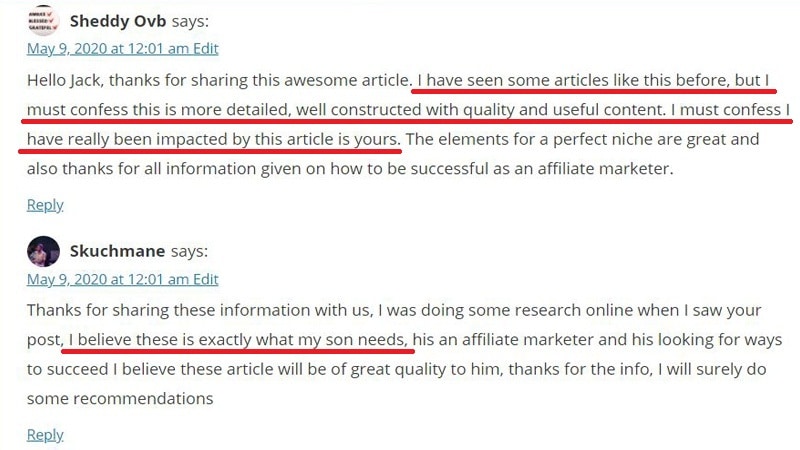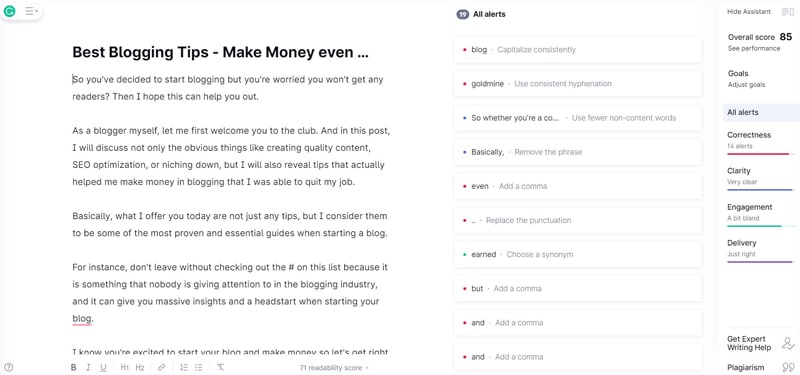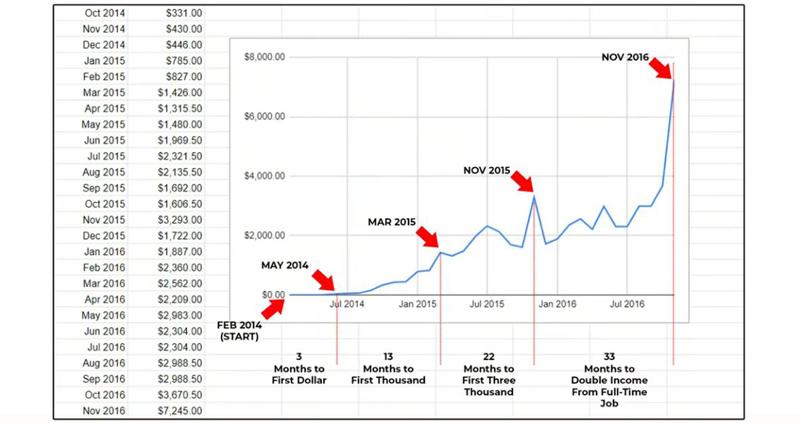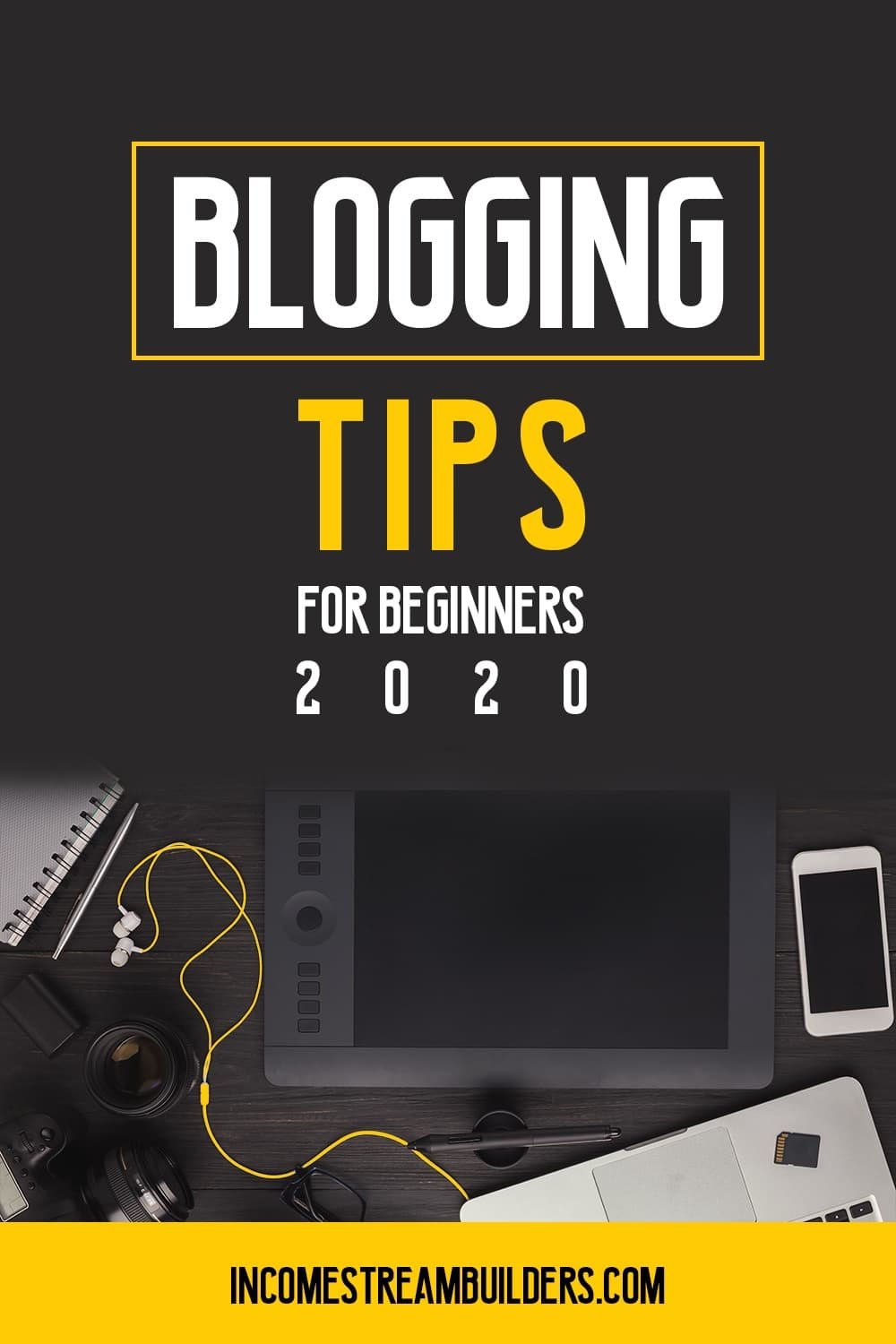Want to know the best blogging tips that will optimise your blog for traffic and monetisation? Hang tight, because you will learn a whole bunch of stuff on this article.
Let’s start with this…
And on top of the “secret” tip I discussed in the video above, here’s 14 more timeless and proven blogging tips for you.
1. Choose a Profitable Niche for your Blog
While starting a blog based on your passion (or interest) has been the “go-to” approach by many, another great way that I can recommend for beginners is to start a blog based on proven profitable niches.
Now, I am not suggesting that the latter is better, nor am I saying that one is wrong and the other one is right. Both approaches can work (and have worked) for bloggers.
But if I’m not mistaken, you want to start a blog hoping to turn it into a passive income stream in the future. So what’s the point of starting a blog based on a topic that has little to no income potential?
Although, you may ask…
Isn’t starting a blog in popular niches not advised for beginners?
If you’re just starting a blog today based on popular and profitable niches out there, say Health & Wellness or Internet Marketing…
There will be a heck of competition and every blogger is hoping to get a share of the pie.
Fortunately, there is a way to stand out from your competitors and attract readers to your blog within a popular topic – and that is by niching down.
Niching down means focusing on a specific topic within a particular niche and becoming the go-to expert in that particular topic.
For example, Income Stream Builders is a blog I started that belongs in the Internet marketing niche. I could discuss eCommerce like selling on Amazon or dropshipping here; well, I can.
But I focused on blogging and affiliate marketing since those two are my areas of expertise and I want to provide assistance to the people that belong in this niche.
If you’re still wondering which blogging niche you should start with, then I recommend reading this article. It will help you choose the most suitable niche for your blog.
2. Identify and Connect with your Target Audience
Your blog is not just about you sharing your expertise, but it’s more about who you are writing for and how you can help them.
Therefore, having a firm grasp of who your target audience is and understanding their needs and wants will separate you from your competitors.
By knowing the pain points of your audience, you will have a clear idea of how to connect with them and how you can help them best.
I don’t want you to think I’m bragging, but as an example, here are some of the recent comments I get in this blog. I’m hesitant to share them but I want to show you that I’m not just making statements based on assumptions.
This is from the article I wrote on the 240 unheard blogging niches…


And here are some readers’ comments on my post about how to become successful with affiliate marketing and beginners guide on making money with Pinterest.



Again, please don’t think that I’m just being boastful or showy. I just want to give you an idea of how your audience will react if you connect to them and you give them exactly what they want.
3. Create original, well-researched (factual) and quality contents
Make your blog a goldmine of information for your audience. That should be your goal.
Creating each of your blog posts will require time and dedication, and depending on your skills and experience in your niche, it could take many hours to complete a single article.
Nevertheless, strive quality over quantity.
When I started blogging, it would sometimes take me days just to complete a single article.
But overtime, as I gained experience, I learned how to produce high quality and original contents faster. But it all started slow.
And whether you’re a newbie or an experienced blogger, always prioritize giving the best value to your readers.
Provide facts and support your facts with stories and personal experience. Don’t just write contents for the sake of publishing something on your blog.
In the end, people will come to your blog and trust you because of the quality and the value they get, and not based on how many articles you’ve published.
And in terms of SEO, keywords are important so that Google and other search engines will understand what your blog is all about.
However, you should never sacrifice the quality of your contents so you can stuff in as many target keywords in your article.
Be genuine in helping your audience first.
4. Keep your blog design simple yet professional
Your blog is there to give information. So as much as possible, convey your message and deliver information to your readers without them having a headache.
What I mean is avoid using distracting themes, fancy fonts, and unpleasant color schemes. Use a simple blog theme and layout optimized for your reader’s best experience.
Think about it… What good is your blog to your audience, even if it’s a goldmine of information, if they can’t properly read your contents. (again, your blog is more about your reader’s best interests)
Furthermore, spend time creating a proper “About” page for your blog.
In this age when anyone can basically start a blog within minutes, your “About” page is a good way to introduce yourself to your readers, tell your story, and show your experience (and results) in this industry.
That way, your readers will have a better idea of who they are getting their information from and why they should listen to you.
And aside from an About page, another thing that people can directly connect to your brand is your logo.
Having a professional-looking logo is another good way to allow people to have a lasting impression on what your blog represents.
You don’t need to be a graphic designer (or hire one) to accomplish this. All you need is time and a good tool like Canva. Here’s how…
5. Make your blog mobile device friendly
Let me rephrase that – make sure your blog works on all possible web surfing devices.

I’m not talking about getting the latest or the most sophisticated plugins and themes to do this.
What matters is that your content displays properly on all screens, regardless of where your audience is viewing it, e.g., laptop, desktop, smartphone or tablets.
According to Statista, 52% of global Internet traffic in the first quarter of 2020 comes from mobile devices.

With these numbers, optimizing your blog to work on all kinds of devices is not just an option but a necessity, especially if you are looking to monetize your blog today.
Needless to say, it is safe to assume that the popularity of the desktops (and laptops) as the primary means of surfing the Internet is decreasing, and if you want to remain relevant in the industry, you have no choice but to adapt.
The continuously increasing number of people who are doing regular searches on mobile devices is also the reason why successful bloggers today don’t rely on a single source of traffic for their blogs, which I will discuss in a moment.
6. Make reading an enjoyable experience for your audience
Let’s get real.
Aside from bookworms and avid readers, most people don’t really like reading anything – your blog included.
If only people don’t need the information you share on your blog, I’m telling you they would rather do something else.
Therefore, one thing you must consider when writing contents for your audience is to present your information in a palatable, easy-to-digest, and entertaining way.
It’s your job as a blogger to make reading an enjoyable experience for your audience.
There are some “tricks” to accomplish this.
First, use simple words and terms. Don’t give your readers a hard time by using complicated terms and words. In a way, write like a third grader – honest, direct to the point, simple.
Second is you should break up long sentences into different independent clauses. Long and run-on sentences are hard to understand and might bore your readers.
Third, use short paragraphs. Which of the two articles below would you read?

I don’t know about you but the one on the right seems more pleasing.
Long paragraphs discourage users from even trying to understand your material.
Remember, your audience knows where to find similar articles on the same topic, and the “close” button is right there in the corner of the screen. Don’t make them click it.
And finally, read your article out loud.
As funny as it sounds, this works. By reading your copy out loud, you’ll find sections that are hard to read or too long.
7. Use Magnetic Titles and Headlines
A study by a marketing research firm reveals that a person sees an average of 5,000 advertisements daily – yes including you.
But you might be having trouble remembering even a hundred of them because most of the ads you see don’t relate to you and they didn’t capture your attention.
Now when it comes to your blog, it only takes about 8 seconds for an average person to decide whether it’s worthy to read your contents or not.
This is why your blog titles play an important role to get the attention of readers. Because even if your articles are ranking on search engines, you still need people to click it.
And even if you get someone to click to your post, you will need to write good headlines all throughout your article to encourage your reader to continue consuming your contents.
Here are 7 rules on how to write effective and magnetic headlines…
- Understand your audience
- Keep it concise and crisp
- Speak your audience’s language
- Be unique and unpredictable
- Evoke curiosity
- Evoke emotions
- Use power words
I’ve discussed these things in detail in the video below.
8. Add appropriate images to your posts
Do you want to know why many people leave halfway through reading a blog?
It’s not just that they don’t get the information they want, but it’s probably because they got tired of seeing too many words.
As I’ve discussed earlier, most people don’t like reading.
And when there is nothing of visual interest for them for quite some time, they leave. Unless your contents are really compelling.
By the way, here’s some of the money you can potentially earn if you finish reading this article and implement the blogging tips you’ll learn here.

Kidding aside, on top of providing visual entertainment to your audience, images on your blog also help illustrate the point you are making.
Images help you convey an idea more effectively, and if you’re giving instructions, images are the next best thing to a video recording to show your readers the exact things you are talking about.
Images also play a role for SEO purposes.
When you name your image files properly and add appropriate alt tags, it will help Google understand what your content is all about.
You can choose to buy premium images or use free ones for your blog on sites like Pexels, Shutterstock, or Pixabay.
And if you want to make it more personal, you can create your own images to use for your blog using Photoshop or Canva.
9. Build your Email list
You want consistent eyeballs for your blogs, right?
You can establish a strong relationship with your audience and grow your followers by building your email list.
If your audience enjoyed your articles and found them useful, they would love to stay updated with the new blogs you publish in the future, and you can do so by sending contents directly to their inbox.
You can sign up with email marketing platforms like GetResponse or Aweber and offer something valuable in exchange for your readers’ email, maybe a free webinar or online course.
Building an email list is also a good way to stay connected with your audience in case your social media pages (e.g., Facebook, Twitter, etc) or Youtube channel are having some issues.
Having a large email list will also play a crucial role when it comes to the monetization of your blog.
10. Practice Proper Monetization of your Blog
One of the most common mistakes I notice new bloggers make is they focus heavily on making money immediately rather than providing value to their readers first.
Okay, I don’t want to sound like a hypocrite. I understand that you probably want to start a blog to make money online.
In fact, blogging is how I make a living too!
Nonetheless, there is a proper way to monetize your blog and trust me when I say this, when you put your audience’s best interest first, money will follow.
Aside from email marketing, there are many good ways to monetize a blog.
Two of the most popular ones are affiliate marketing and joining ad networks.
You can find products to promote using affiliate marketing by joining affiliate networks.
However, don’t promote inferior affiliate products that might jeopardize your good relationship with your audience.
And when it comes to sharing ads on your blogs, there are beginner-friendly ad networks that will let new bloggers with little or no regular traffic source join.
But be careful not to riddle your blog posts with ads. I’m sure you can relate how annoying getting into a page to learn something only to get bombarded with ads to your face.
That being said, one of the reasons that makes blogging a very enticing career is that you have flexibility and a lot of options on how you can make money. You just have to do them properly.
11. Always Proofread and Review your Blog Posts
No matter how skilled you are in writing, the fact remains that we are still human beings, and we are bound to make errors. Much more if you are new to blogging.
Therefore, to maximize your audience’s good experience, make it a habit to always review your blog posts before publishing them.
See that there are no spelling or grammatical errors, it’s in the proper format, the headlines are good, the images are showing properly, the links are working, etc.
You worked hard to give your audience the best information and you’ve probably done hours of research, but all that can be ruined by a misspelled word.
And in terms of income, you might lose commission if your affiliate link dont work. I know you don’t want that.
Furthermore, you must also proofread your copy to make sure that you clearly convey the message you want to tell your readers. There might be an angle you failed to discuss or a certain fact you forgot to mention.
It’s best to take a break after you completed an article, then re-red it with a fresh mind.
One of the tools that have helped me big-time when checking my articles for spellings, grammar consistencies and errors is Grammarly.

As you can see, this article initially only has an overall score of 85 and has 19 issues that I haven’t would have noticed without Grammarly.
12. Get more Blog Topic Ideas from your Competitors
Here’s a video guide on how to leverage on your competitor’s website to generate blog topic ideas:
Now as I mentioned earlier, starting a blog in a profitable niche exposes you to a stiff competition.
However, You can use that fact to your advantage. Making lemonades out of lemons, if you will.
Based on my experience, by the time you’ve written over 100 articles on your blog, you will start to run out of ideas. Of course, it also depends on the size of your niche and the sub niches that you discuss in your blog.
The point is, time will come when you run out of ideas for good topics. When this happens, what you can do is visit some of your competitors blogs.
Take a look at topics that are getting a lot of attention and discuss them on your blog as well.
The good thing about this strategy is that you don’t have to wait for later to do this. You can do this immediately after you start your blog.
See what topics within your niche are popular to your audience and many of other blogs are writing about. Then write about it too.
But don’t just copy the article and write it on your own words. I’m sure you know that’s not what I mean.
The best thing to do would be to find an area of the topic that wasn’t properly discussed by your competitors and tackle those for your readers.
The original idea may not be yours but you can still make your article unique by attacking a different angle and presenting ideas and personal opinions that nobody else has talked about.
In short, strive to make your article the best version from all the rest.
13. Don’t be afraid to Invest on your Blog
If you want to succeed in blogging, you have to invest time, effort, and money as well.
There’s only so much you can learn from free stuff on the Internet.
Free webinars and online courses are good to set your foundations right, but when it comes to the nitty gritty part of blogging, I learned how to put all the cogs together through paid courses.
Believe me, when I started, I wouldn’t spend a single penny for an online course.
But what I realized now is that I may have found success faster if I invested in paid blogging courses right from the start. Like this blogging course.
I’m not suggesting you spend your life savings and emergency funds for a blogging course. Just go with what you can and at your own pace.
But the point, if you’re serious about blogging, you have to accept the fact that you have to invest money on your blog and to gain knowledge.
And as much as I hate to use this as an example, it is one of the best eye openers for me, and here it goes…
I have no intention of undermining your profession or expertise, but think about how much you’ve spent to get your degree, and yet here you are (like I was a few years ago) hoping to learn how to make money with blogging.
I have a degree in Economics and Finance, yet I ended up quitting my job to pursue blogging because it allowed me to live the life I want to.
I can now spend time with my family whenever I want, and in terms of finances, it’s better than what I’m earning with my previous 9-5 job. A lot better.
But it’s not just about online courses. You also need to spend money on your blog’s upkeep like hosting, themes, plugins, etc to give your audience the best experience possible.
I understand that newbies usually don’t want to spend money on online courses because they’re afraid it might not be worth it.
But the truth is, I wouldn’t be here today without the knowledge and skills I’ve acquired through paid training and online courses.
14. Consistency is Key
You’ve probably heard (or read) this a million times before, nonetheless, it is the truth.
When I first started blogging, it took me months before I earned my first $8.

Yes, I only made 8 dollars. (you can watch the full video here)
I want to tell you that blogging is easy, but it is not. Don’t get me wrong, blogging is simple, and any beginners can succeed on their first try, but it’s not easy.
As for me, it wasn’t a smooth journey, and I had to overcome different challenges along the way. But looking back, it sure was worth it.
As you already know, I was eventually able to quit my job and currently makes a living by blogging.
Blogging is a long term game. It will start slow, and you will not see immediate results. You will get frustrated, you’ll see crickets, and you won’t earn a dime – at first!
But shake it off, keep going (like I did), and you’ll get there.
If you just continue what you’re doing, follow through a game plan, keep learning the right things and implement them correctly, you’ll get there.
And for the final tip…
Take action now!
While I can personally vouch on the blogging tips I’ve shared with you here, they can only help you as much, and you will only find success by taking action.
So what are you waiting for? Get blogging now!
Need help? Check out the blogging course that got me out of my full-time job.
But in case you still need more help, you can let me know in the comment section below.
It would be my pleasure to take your hand and show you the way,
Anyways, thank you for reading this post, and I wish you all the best.
Your friend,
Jack
Recent Content
9 Best Niche Ideas For Pinterest Affiliate Marketing 2020 & Beyond
If you're looking for ways to start a profitable affiliate marketing business on Pinterest, then this is for you. According to Pinterest Newsroom, the COVID 19 pandemic has caused a significant...
So, you're looking for good ways to generate an income using your ability to speak more than one language? Then this is perfect for you! I took the time and compiled a list of 11 high paying...


